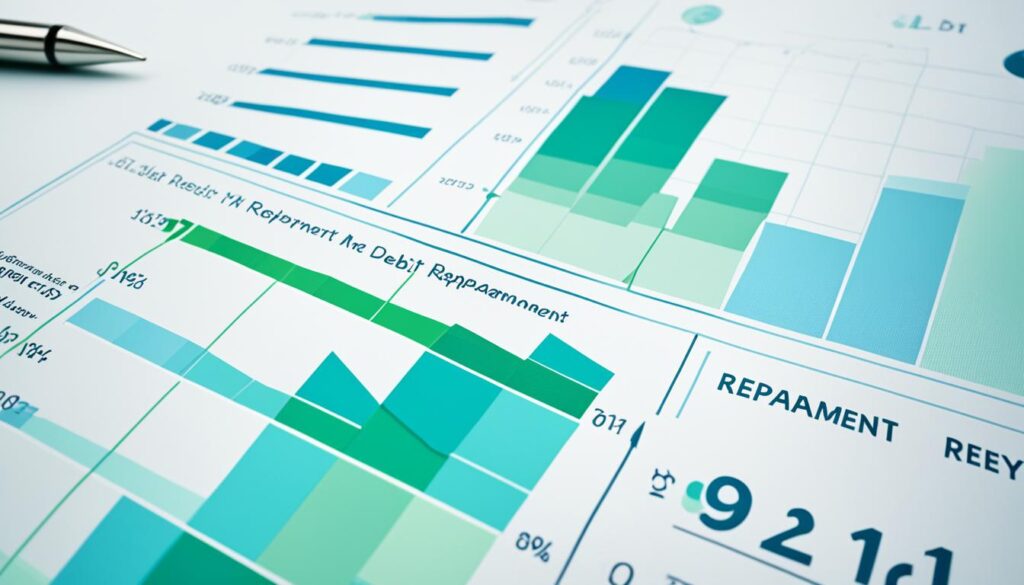In today’s fast-paced world, it’s easy for debt to accumulate and financial goals to be pushed aside. We’ve all been there – juggling multiple credit card debts, student loans, and a mortgage, feeling overwhelmed and unsure of how to regain control. But let me share a story that might resonate with you and set the stage for effectively managing your debt repayment with accountability and responsibility.
Alexis, a hardworking professional, found herself drowning in credit card debt after a series of unexpected expenses. She had always been responsible with her finances, but life had thrown her a curveball. Alexis knew it was time to take control and face her mounting debt head-on.
She started by creating a detailed list of all her outstanding debts, including their interest rates. This allowed her to visualize her financial situation and prioritize which debts to tackle first. Alexis then decided to check her credit report for accuracy, noticing a small error that had negatively impacted her credit score. She took immediate action and successfully disputed the error, boosting her creditworthiness and giving her a stronger financial foundation.
With a clear understanding of her debts and an improved credit score, Alexis explored opportunities for debt consolidation. She consolidated her high-interest credit card debts into a single personal loan with a lower interest rate, making monthly payments more manageable. This not only simplified her repayment process but also allowed her to save on interest charges, putting her on the fast track to debt freedom.
Key Takeaways:
- Creating a list of outstanding debts and checking your credit report are essential first steps in managing debt.
- Consolidating debt can make repayment more manageable and potentially save money on interest charges.
- Being accountable and responsible in debt management is crucial for achieving financial freedom.
- Regularly assessing and reevaluating your spending habits can help prevent further debt accumulation.
- Developing a debt-reduction strategy tailored to your financial goals is key to successful debt management.
Steps to Take for Effective Debt Management
To effectively manage your debt, it is crucial to adopt financial responsibility and track your debt repayment progress. By following these steps, you can take control of your finances and work towards a debt-free future.
Create a Comprehensive Debt List
Start by creating a comprehensive list of all your outstanding debts. Include details such as the debt amount, interest rates, and minimum monthly payments. This list will serve as a foundation for your debt management strategy, helping you prioritize your repayments.
Check Your Credit Report
Regularly check your credit report to ensure accuracy and identify any forgotten debts or discrepancies. By staying informed about your debt obligations, you can make more informed decisions and take appropriate actions to resolve any issues.
Consider Debt Consolidation
If you have multiple high-interest debts, consider debt consolidation to streamline your repayment efforts. Debt consolidation involves combining multiple debts into a single loan with a lower interest rate. This can simplify your payments and potentially save you money in interest charges.
Be Honest About Your Spending
To effectively manage your debt, it is essential to be honest about your spending habits. Identify areas where you can cut back on unnecessary expenses and redirect those funds towards your debt repayment. A careful evaluation of your budget can uncover opportunities for savings.
Determine Affordable Monthly Payments
Assess your financial situation and determine how much you can afford to pay towards your debt each month. Allocate extra funds from your budget to debt reduction, prioritizing higher-interest debts. By consistently making these payments, you will make progress towards reducing your debt burden.
Choose a Debt-Reduction Strategy
Select a debt-reduction strategy that aligns with your financial goals. Whether you choose to pay off high-interest balances first or focus on the lowest balances, having a clear plan in place will provide structure and motivation for debt repayment.
“Financial responsibility plays a vital role in debt management. By tracking your debt repayment progress and adopting responsible financial habits, you can achieve long-term financial stability.”
Tracking your debt repayment progress and exercising financial responsibility are key to effectively managing your debt. By implementing these steps and staying committed to your debt management plan, you can regain control of your finances and pave the way to a debt-free future.
Managing Business Debt Effectively
When it comes to managing business debt, accountable financial planning is essential. Whether your business debt is incurred for funding operations or expanding your business, having a well-defined plan is crucial to stay on track. By implementing accountable debt repayment techniques, you can effectively manage your business debt and safeguard the financial health of your company.
To start, it is important to assess your current debts and gain a clear understanding of your outstanding balances and interest rates. Creating a detailed list will allow you to prioritize your repayment efforts and make informed decisions about resource allocation. This step ensures that you tackle high-interest debts first, minimizing the overall financial burden.
Developing effective repayment strategies is another key aspect of managing business debt. One technique is allocating additional funds towards high-interest debts while making minimum payments on other debts. This targeted approach enables you to minimize the interest paid over time and accelerate your debt reduction progress.
Moreover, negotiating with creditors can play a crucial role in managing business debt effectively. By engaging in open communication and demonstrating your commitment to debt repayment, you may be able to negotiate more favorable terms. This can include obtaining lower interest rates, extended repayment periods, or reduced settlement amounts, ultimately easing the financial strain on your business.
In addition to accountable debt repayment techniques, sound cash flow management practices are essential for preventing the accumulation of excessive liabilities. Regularly reviewing your financial statements, maintaining a cash reserve for emergencies, and implementing effective expense control measures will help you stay on top of your business finances and avoid unnecessary debt.
To visually illustrate the importance of accountable financial planning and debt repayment techniques, refer to the table below:
| Debt Management Strategy | Benefits |
|---|---|
| Creating a comprehensive list of debts | Provides clarity and prioritization |
| Allocating additional funds towards high-interest debts | Minimizes overall interest expenses |
| Negotiating with creditors | Potential for more favorable repayment terms |
| Implementing sound cash flow management practices | Prevents the accumulation of excessive liabilities |
By effectively managing your business debt through accountable financial planning and debt repayment techniques, you can secure the financial stability and growth of your company. Remember that regular monitoring, disciplined financial habits, and open communication with creditors are key to successfully managing business debt.

Quote:
“Accountability is the foundation of responsible debt management, and it holds the key to financial success for businesses large and small.” – John Thompson, Financial Advisor
Strategies for Negotiating with Creditors
Negotiating with creditors is a crucial step in effectively managing your debt. By implementing the right strategies, you can find a resolution that works for both parties and helps you stay committed to debt repayment. Here are some debt accountability tips to navigate the negotiation process:
- Establish Open Communication: Communication is the key to successful negotiations. Initiate open and transparent conversations with your creditors, explaining your financial situation honestly.
- Understand Your Financial Numbers: To strengthen your negotiation stance, it’s essential to have a clear understanding of your financial numbers. Prepare thorough reports showcasing the state of your business, including income, expenses, and current assets.
- Offer Alternative Repayment Options: During negotiations, you can propose alternative repayment options that align with your financial capabilities. This shows creditors your commitment to repaying the debt, even if it means restructuring the terms.
- Seek Professional Advice: Don’t hesitate to seek guidance from financial experts who specialize in debt management. They can provide valuable insights, negotiation strategies, and help you navigate the complexities of the process.
- Stay Disciplined and Communicate Regularly: Throughout the repayment process, it’s crucial to stay disciplined in your debt management efforts. Make regular payments and communicate with your creditors, demonstrating your commitment to fulfilling your obligations.
“Negotiating with creditors requires a balance of assertiveness and empathy. By demonstrating your commitment to debt repayment and effectively communicating your financial situation, you can work towards finding a mutually agreeable solution.” – [Name]
With these debt accountability tips and strategies for negotiating with creditors, you can navigate the negotiation process with confidence and increase the chances of reaching a successful resolution. Remember to stay committed to your debt repayment goals and seek professional guidance when needed.
Debt Consolidation and Refinancing Options for Debt Management
When it comes to effectively managing your debt, exploring debt consolidation and refinancing options can streamline your repayment and potentially save you money.
Debt consolidation involves combining multiple high-interest debts, such as credit card balances or personal loans, into a single loan with a lower interest rate. This simplifies your repayment process and reduces the overall interest you pay, making it easier to manage your payments and potentially pay off your debt sooner.
Refinancing is another strategy that involves replacing an existing loan with a new one that offers better terms or lower interest rates. This can be especially beneficial if you have a mortgage or a business loan with unfavorable terms. By refinancing, you can potentially reduce your monthly payments or shorten the loan term, allowing you to save money in the long run.
Before deciding whether debt consolidation or refinancing is the right option for you, it’s important to conduct a careful evaluation of your financial situation. Consider factors such as the impact on your credit score, associated fees, and the overall cost of the new loan. Seeking guidance from a trusted financial advisor can help you assess which option aligns best with your needs and goals.
| Debt Consolidation | Refinancing |
|---|---|
| Combines multiple debts into one | Replaces an existing loan with a new loan |
| Lower interest rate | Better terms or lower interest rates |
| Simplifies repayment process | Potential reduction in monthly payments or loan term |
| Reduces overall interest paid | Potential long-term savings |

Whether you choose debt consolidation or refinancing, it’s important to remember that responsible financial planning and accountability are key to successfully managing your debt. By taking proactive steps to address your financial situation, you can pave the way to a healthier financial future.
How Can Being Accountable in Debt Repayment Help with Negotiating Settlements?
Being accountable in debt repayment is crucial when negotiating settlements. By following tips for negotiating debt settlements, such as making regular payments and showing a commitment to clear the debt, you can demonstrate a sense of responsibility and willingness to resolve the issue, which can help in negotiating favorable settlement terms.
How Can Effective Accountability Help Manage Debt Repayment?
Effective accountability is crucial in navigating debt repayment challenges. By setting clear goals, keeping track of expenses, and regularly reviewing progress, individuals can better manage their debt repayment. Accountability can help stay on track and make necessary adjustments to achieve financial freedom.
Conclusion
Debt repayment accountability is the key to achieving financial freedom. By taking a proactive approach and implementing responsible debt management strategies, you can effectively manage your debt and pave the way to a stronger financial future.
Start by taking account of your debts and creating a comprehensive list. This will help you gain clarity on your outstanding balances and interest rates. Check your credit report regularly to ensure its accuracy and identify any discrepancies that may be affecting your credit score.
Consolidating your debts can be a smart move to make your payments more manageable. By combining multiple high-interest debts into one with a lower interest rate, you can reduce your monthly payments and simplify your financial obligations.
To make accountable debt repayment even more effective, be honest with yourself about your spending habits. Identify areas where you can cut back and allocate those funds towards debt reduction. Determine how much you can afford to pay each month and stay committed to your debt-reduction strategy.
In business, accountable financial planning is crucial. Assess your current debts, prioritize repayments, and implement sound cash flow management practices to prevent excessive liabilities in the future. Negotiating with creditors and considering options like debt consolidation and refinancing can provide further relief and support your overall debt management efforts.
By embracing debt repayment accountability and adopting responsible debt management techniques, you can take control of your financial situation and achieve long-term financial stability.
FAQ
How can I effectively manage my debt repayment?
To effectively manage your debt repayment, you should create a list of all outstanding debts, check your credit report for accuracy, explore opportunities for consolidation, reevaluate your spending habits, determine how much you can afford to pay each month, and devise a debt-reduction strategy.
What steps should I take for effective debt management?
First, create a comprehensive list of all your outstanding debts, including their interest rates. Next, check your credit report for any forgotten debts or discrepancies. Consider opportunities for debt consolidation to lower interest rates and make repayment more manageable. Be honest about your spending and identify areas where you can cut back to limit additional debt. Determine how much you can afford to pay each month and allocate extra funds from your budget to debt reduction. Finally, choose a debt-reduction strategy that aligns with your financial goals.
How can I effectively manage my business debt?
To effectively manage business debt, it is crucial to have a plan and be accountable. Assess your current debts, create a list of outstanding balances and interest rates, and prioritize repayment efforts. Develop strategies for repayment, including allocating additional funds towards high-interest debts and negotiating with creditors. Implement sound cash flow management practices to prevent future accumulation of excessive liabilities.
What are some strategies for negotiating with creditors?
To negotiate successfully with creditors, establish open communication and be transparent about your financial situation. Understand your financial numbers and prepare thorough reports showcasing the state of your business. Offer alternative repayment options and demonstrate your commitment to repaying what you owe. Seeking professional advice from financial experts can also be beneficial in navigating negotiations.
How can debt consolidation and refinancing help with debt management?
Debt consolidation involves combining multiple high-interest debts into one loan with a lower interest rate, making payments more manageable. Refinancing replaces an existing loan with a new loan that offers better terms or lower interest rates. Carefully evaluate your financial situation, considering factors like credit score impact and associated fees, before opting for consolidation or refinancing. Seeking guidance from a trusted financial advisor can help assess which option is suitable for your needs.
Why is debt repayment accountability important?
Managing debt repayment accountability is crucial for achieving financial freedom. By taking account of your debts, checking your credit report, consolidating debts, being honest about spending, determining affordable payments, and devising a debt-reduction strategy, you can effectively manage your debt. Being accountable and responsible in debt management paves the way to financial freedom.

